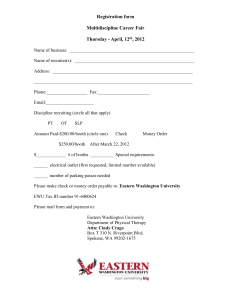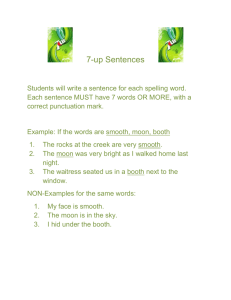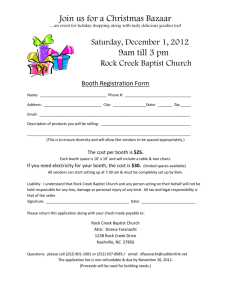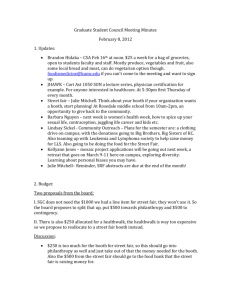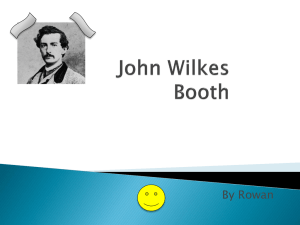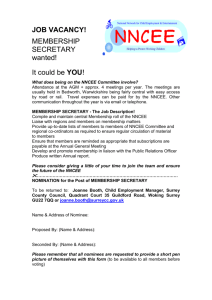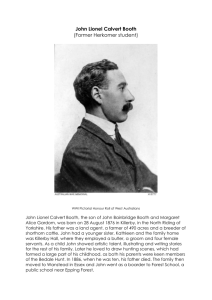Central America Politics
advertisement
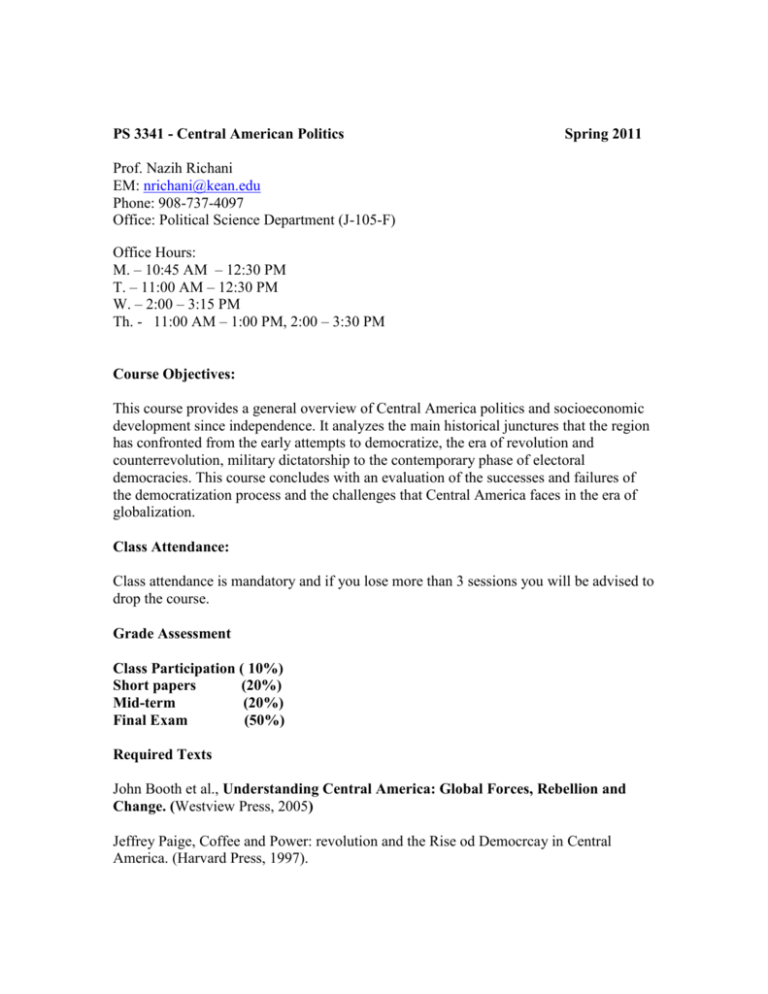
PS 3341 - Central American Politics Spring 2011 Prof. Nazih Richani EM: nrichani@kean.edu Phone: 908-737-4097 Office: Political Science Department (J-105-F) Office Hours: M. – 10:45 AM – 12:30 PM T. – 11:00 AM – 12:30 PM W. – 2:00 – 3:15 PM Th. - 11:00 AM – 1:00 PM, 2:00 – 3:30 PM Course Objectives: This course provides a general overview of Central America politics and socioeconomic development since independence. It analyzes the main historical junctures that the region has confronted from the early attempts to democratize, the era of revolution and counterrevolution, military dictatorship to the contemporary phase of electoral democracies. This course concludes with an evaluation of the successes and failures of the democratization process and the challenges that Central America faces in the era of globalization. Class Attendance: Class attendance is mandatory and if you lose more than 3 sessions you will be advised to drop the course. Grade Assessment Class Participation ( 10%) Short papers (20%) Mid-term (20%) Final Exam (50%) Required Texts John Booth et al., Understanding Central America: Global Forces, Rebellion and Change. (Westview Press, 2005) Jeffrey Paige, Coffee and Power: revolution and the Rise od Democrcay in Central America. (Harvard Press, 1997). Students are responsible for becoming familiar with, and will be held accountable for, the Kean University Academic Integrity Policy and the Student Code of Conduct. The Academic Integrity Policy is available at www.kean.edu/forms/AcademicIntegrity,pdf or the Web site for The guide at www.kean.edu/publications/TheGuide2007.pdf., and the Student Code of Conduct is available at www.kean.edu/~conduct or the Web site for The Guide at www.kean.edu/publications/Theguide2007.pdf. Dates to Remember: January 24 January 31 February 7 February 7 March 11 Last day to WD with 100% refund Last day to WD with 75% refund Last day to declare course as audit Last day to WD with 50% refund or P/F Last day to withdraw with W grade Course Outline and Schedule Session 1 introduction Session 2: The Socio-Historical Context Booth et al Understanding Central America, Chapters 1 and 2. Session 2. Context Cont. Booth chapter 3 & Jeffrey Paige, Coffee and Power, chapter 1 Session 3. Costa Rica: “The Anomaly” Explaining the Root causes of the exceptional Case? Booth Chapter 4 Session 4. Costa Rica cont. Paige pp.219-71 Session 5. Nicaragua; Dictatorship, Revolution and Counter Revolution Booth, chapter 6 & Paige pp 153-183 Session 6. Nicaragua (cont). Session 7. El Salvador “The Unfinished Revolution” Booth, chapter 6 Session 8. El Salvador cont. Paige, pp187-219 Session 9. Guatemala: Dictatorship and Protracted Civil War Booth chapter 7 Session 10 Mid term Session 11.Guatemala (paper to read Hidden Power) access paper from the Washington Office of Latin America (WOLA ) website. Session 12. Honduras “Frustrated Revolution” Booth chap 8 Session 13.Film Session 14. Democratization in the Region Booth chapter 9 Session 15. Democratization, Liberalism, Neoliberalism and Criminal Violence: From “Peasant Wars to Slum Wars” Paige 315-368 & Rodgers, Dennis (2007). Slum Wars of the 21st Century: The New Geography of Conflict in Central America. Crisis States Research Center. Working Paper no.10. (You can access this paper online) Session 16 US- Central America Relations Booth Chapter 10 Session 17. US- Central America Relation cont. Session 18.TBA Session 19 TBA Session 20 TBA Session 21. Review May 4 Final Exam.
